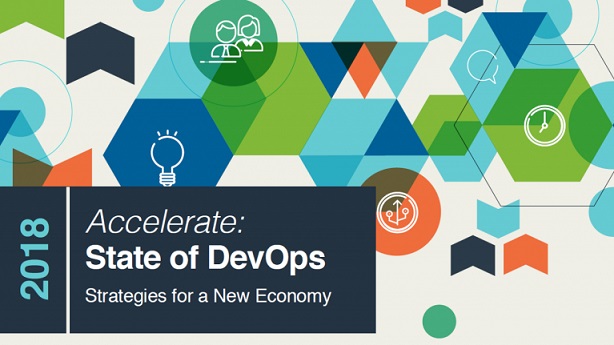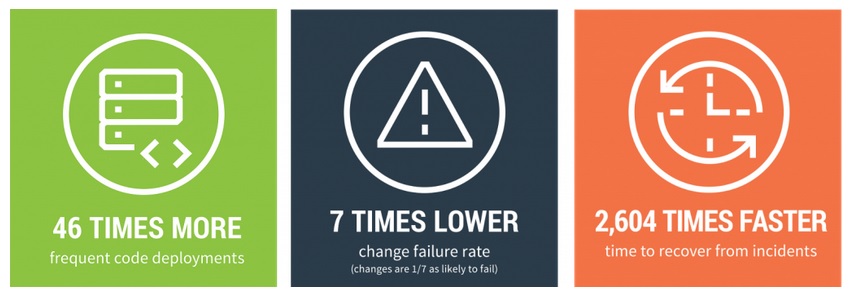GitLab announced the general availability of GitLab Duo with Amazon Q.
You'll probably have heard of the Accelerate State of DevOps Report from DORA. Now in its fifth year and backed by rigorous research involving 30,000+ professionals worldwide, it has consistently shown that higher software delivery performance delivers powerful business outcomes.

There's a welcome insight in the 2018 report, however, because for the first time it calls out database development as a key technical practice which can drive high performance in DevOps. This matches similar findings in research from Redgate Software, which sponsored the report and provided input.
Database development has entered the picture because deploying changes to the database is often the bottleneck in software development and slows down releases. To address this, the report investigated which database-related practices help when implementing continuous delivery to improve software delivery performance and availability.
The results revealed that teams which do continuous delivery well use version control for database changes and manage them in the same way as changes to the application. It also showed that integrating database development into software delivery positively contributes to performance, and changes to the database no longer slow processes down or cause problems during deployments.
The highest performing organizations which adopt DevOps release changes 46X more frequently
The starting block is communication, cross-team collaboration and visibility, which echoes Redgate's own 2018 State of Database DevOps Survey earlier in the year. This showed that 76% of developers are now responsible for both application and database development, and 58% reported their development teams and DBAs work on projects together.
In terms of DevOps itself, the report shows that the highest performing organizations which adopt DevOps release changes 46 times more frequently, have a change failure rate that is 7 times lower, and are able to recover from breaking changes 2,604 times faster.

Crucially, the lead time from committing changes to being able to deploy them is less than one hour in the highest performing organizations – and between one and six months in low performers. Between 46% and 60% of changes deployed by low performers also require some form of hotfix, rollback, or patch.
Beyond those figures, there is one sentence in the report that stands out as the key differentiator and reason for adopting DevOps:
"Those that develop and deliver quickly are better able to experiment with ways to increase customer adoption and satisfaction, pivot when necessary, and keep up with compliance and regulatory demands."
This ties in with achieving regulatory compliance by adopting database DevOps. The automation it encourages and the audit trails it provides across the database development process ease compliance so that companies can deliver value faster while keeping data safe.
This is just a glimpse of the value the Accelerate State of DevOps Report offers in terms of understanding the drivers that can improve software delivery and operational performance. The main highlights are:
■ The improved software delivery and operational performance which DevOps introduces unlocks competitive advantages such as increased profitability, productivity, market share and customer satisfaction.
■ The key technical practices which drive high performance include database change management, monitoring and observability, continuous testing, and "shifting left" on security.
■ Teams which leverage all of cloud computing's essential characteristics are 23 times more likely to be high performers.
■ Open source software is 1.75 times more likely to be extensively used by the highest performers.
■ Outsourcing by function is rarely adopted by the highest performers and hurts performance.
■ High performing companies exist in both non-regulated and highly regulated industries.
Industry News
Perforce Software and Liquibase announced a strategic partnership to enhance secure and compliant database change management for DevOps teams.
Spacelift announced the launch of Saturnhead AI — an enterprise-grade AI assistant that slashes DevOps troubleshooting time by transforming complex infrastructure logs into clear, actionable explanations.
CodeSecure and FOSSA announced a strategic partnership and native product integration that enables organizations to eliminate security blindspots associated with both third party and open source code.
Bauplan, a Python-first serverless data platform that transforms complex infrastructure processes into a few lines of code over data lakes, announced its launch with $7.5 million in seed funding.
Perforce Software announced the launch of the Kafka Service Bundle, a new offering that provides enterprises with managed open source Apache Kafka at a fraction of the cost of traditional managed providers.
LambdaTest announced the launch of the HyperExecute MCP Server, an enhancement to its AI-native test orchestration platform, HyperExecute.
Cloudflare announced Workers VPC and Workers VPC Private Link, new solutions that enable developers to build secure, global cross-cloud applications on Cloudflare Workers.
Nutrient announced a significant expansion of its cloud-based services, as well as a series of updates to its SDK products, aimed at enhancing the developer experience by allowing developers to build, scale, and innovate with less friction.
Check Point® Software Technologies Ltd.(link is external) announced that its Infinity Platform has been named the top-ranked AI-powered cyber security platform in the 2025 Miercom Assessment.
Orca Security announced the Orca Bitbucket App, a cloud-native seamless integration for scanning Bitbucket Repositories.
The Live API for Gemini models is now in Preview, enabling developers to start building and testing more robust, scalable applications with significantly higher rate limits.
Backslash Security(link is external) announced significant adoption of the Backslash App Graph, the industry’s first dynamic digital twin for application code.
SmartBear launched API Hub for Test, a new capability within the company’s API Hub, powered by Swagger.
Akamai Technologies introduced App & API Protector Hybrid.




